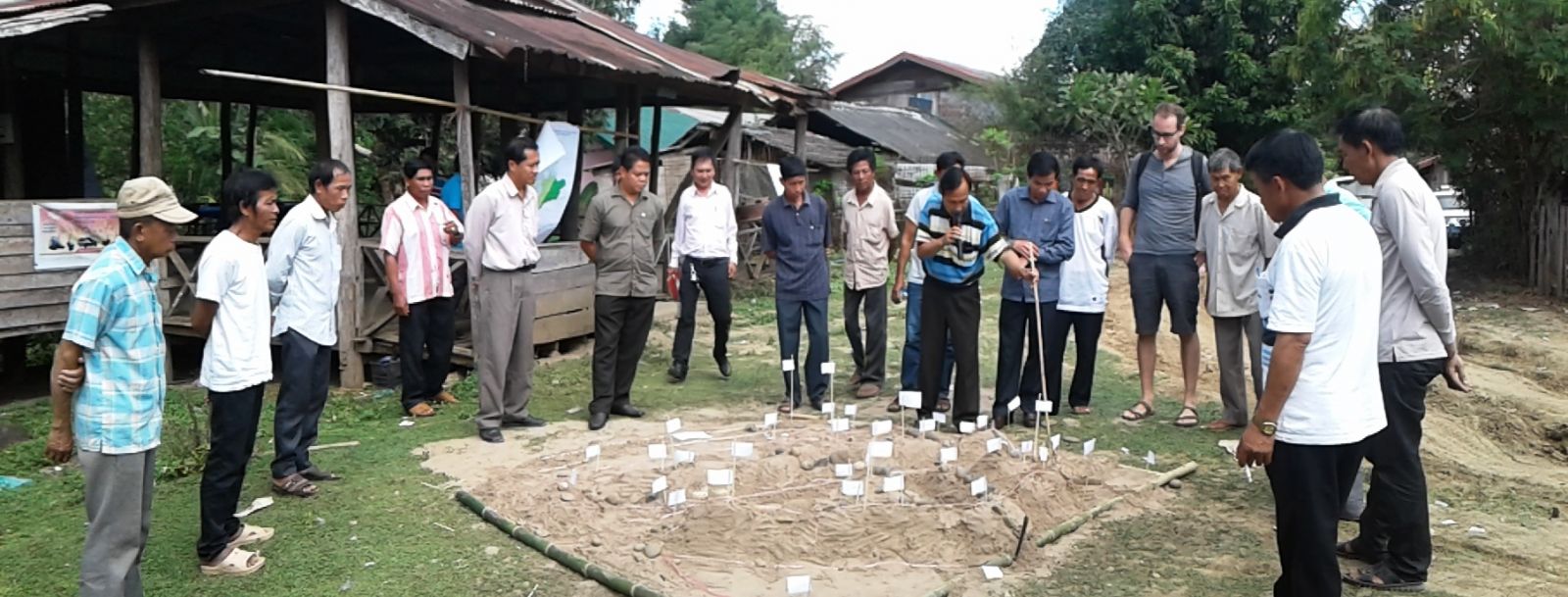The Kuang Si watershed plays an important geographical position not only in terms of environmental ecology and watershed, but also cultural and livelihood space of more than 5,000 peoples of different indigenous groups such as Hmong, Khmu, Lao Loum and Lu, etc. These groups together live in 7 villages of districts of Luang Prabang, Xiang Ngeun and Muong Nan, Luang Prabang province, Laos. Over many generations, these groups have formed their customary rules to manage, protect, use and nurture different sorts of natural resources such as 104 community forests and spirit forest-land-water. These are spatial cultural and livelihood centers from which the religious beliefs via rituals to worshiping Nature’s Spirit, morality, community structure and behavior of the villagers with forest, land and water resources are formed and transmitted.

Village chief presenting the sand-map of the customary natural resource uses of Khok Manh village with participation of Luang Prabang district and provincial authorities (Picture: CHESH Lao/SPERI, 2016)
Since 2014, Luang Prabang District and Provincial People’s Committees, Luang Prabang Provincial Department of Agriculture and Forestry Office, and District of Agriculture and Forestry Offices of the districts of Muong Nan, Xieng Nguen and Luang Prabang with supervision of the CHESH Lao / SPERI have jointly implemented the program on research and support in securing livelihood sovereignty and sustainable co-management of natural resources of various indigenous groups in the Kuang Si watershed in accordance to the local knowledge, customary laws and formal policies.
Identification, mapping and legitimation of the traditional community territories, boundaries of different livelihood-cultural subdivisions, local knowledge based land uses and strengthening of the community governance through customary law and statutory law based community regulation on natural resources management are among activities of the above-mentioned cooperation. This cooperation is financially supported by CCFD.
In addition to a set of paper maps and community regulations for forestland management that are recognized by local authorities and functional departments, the program also implemented an electronic mapping system. This aims to assist the forest land tenure and natural resources governance processes in the post-forest land allocation more transparent and effective.
Kindly see the e-map of livelihood sovereignty of the Lao Loum and Khmu indigenous groups in
Khokmanh village, one of 7 program community sites in the Kuang Si region.
This e-map describes the traditional territory and boundaries, types of topography and natural resources, and socio-cultural economic features of Thapene village. The map is built in accordance with the customary law and land use plans of the Thapene, recognition of local governments and functional bodies, agreement of the neighboring villages and organizations located in the village. This e-map was completed in December 2016 on the basis of field data measured and collected via GPS by villagers, especially elders, village chiefs, heads of community based organizations, technicians of the Luang Prabang District / Province of Agriculture and Forestry Offices, in consultation with SPERI / CHESH Lao and financial support from CCFD-France. This e-map was inserted into the Google Map in December 2016.
* Refer to the
emap of livelihood sovereignty of Thapene village in Luang Prabang province, Laos